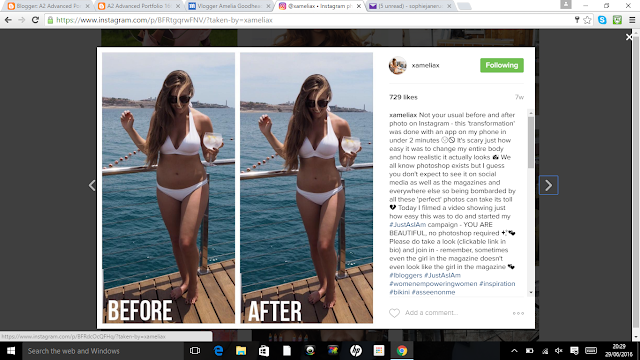As a significant part of my 5 minute documentary, I want to look at the affects of social media on body image and the virtual idealisation of beauty and perfectionism. In order to do this, I really want to focus on a vlogger who I really look up to and I believe is an inspiration to our society. Her name is Amelia Goodhead and her channel name is 'xameliax' on YouTube. A few months ago, she posted the image you can see above on Instagram with two pictures, both of her on holiday - one as she is and another edited. She then goes onto explain how people can easily edit photographs in order to create a false perception of beauty in a way that creates the perfect online persona of themselves.
 |
|
This is the video that
accompanied Amelia's Instagram post, as well as a
blog post - all of which
discussed this campaign and what Amelia
wants to gain from it.
|
Amelia's video about the 'Just As I Am' campaign
Ultimately, I believe there is an evident aim from Amelia to help promote body positivity, in order to try and get young girls to appreciate who they are and embrace it! Even if we do have imperfections, we shouldn't shame ourselves for it as this is part of what makes us unique and ourselves. It may also be seen as making people aware that not everyone is as flawlessly, impossibly perfect as they appear in photographs - maybe some people are - but most of the time it is as a result of an edited photo. Moreover, even alongside these edited photos, young girls especially will still add captions where they complain of their supposed "chubby cheeks" or the fact that they "shouldn't have taken the picture cos the lighting looks bad" or "the angle looks disgusting". For some people, this can make them feel annoyed and even more insecure, but that's why young girls often add these captions.
The media's often dramatised idealisation of the 'perfect' image could be considered key in creating insecurities within young girls - hence why Amelia's campaign is of (to me) such high importance.
However, these are all indeed assumptions and, therefore, this felt the perfect opportunity to try and gain Amelia's own views and experiences regarding this topic. As a result, this lead me onto sending an email to Amelia asking herself if she would like to have an interview in person, she very kindly replied and has accepted my offer. I am extremely happy and looking forward to including the words of such an inspirational woman in my documentary.
 |
| Amelia's 'Just As I Am' campaign featured in 'The Daily Mail'. |
 |
| Her campaign also featured within 'ViralPax' online. |

